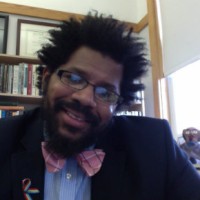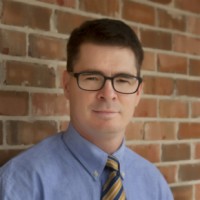Black scholarship speaks
The African American Intellectual History Society, founded in 2014, hosted its first annual conference last weekend at UNC Chapel Hill. Scholars from various disciplines delivered engaging papers around the theme “new perspectives on the black intellectual tradition.”
The changing nature of black identity in today’s world is complex. What does it mean to be black? Or American? Or African American? How should scholars treat the past and the present in relation to race, religion, gender, sexual orientation, and class?
The AAIHS annual conference opens a space for lively scholarly conversation around these questions. Below, three of the conference participants reflect on their experiences.
I presented research from my book in progress, W.E.B. Du Bois’s Editorial Influence on Negro Migration and the Western Color Line. My work addresses the absence of scholarship on black life in the West via Du Bois’s The Crisis magazine.
I discovered at the conference that my current research intersects with that of other scholars. Lavelle Porter explored Du Bois’s work from a creative lens of imagination, a fantasy of salvation and hope often found in his fiction. Phillip Luke Sinitiere considered Du Bois as an environmental intellectual. These seemingly different papers offered similar conclusions, which Sinitiere called “Du Boisian propaganda.” This range of thought has encouraged us to further delve into the perspectives of black intellectual history with Du Bois and others.
Rich conversation emerged from papers exploring Alain Locke’s impact on art, Arturo Schomburg as an Afro-Puerto Rican revolutionist, and the religion of Ralph Ellison’s Invisible Man.
——
African American intellectual history is a vast and diverse field with prospects for religionists, philosophers, historians, sociologists, aestheticists, and political scientists. The conference was especially helpful for the field of religious history, as several presenters looked at black theology and black humanism. The quality of papers and the enthusiasm that they generated at this inaugural conference foreshadow excellent growth for the AAIHS.
I presented on a panel with Phillip Luke Sinitiere, Edward Carson, and Vondre' Cash, a former student of mine who graduated from Southwestern Seminary’s baccalaureate program in the Darrington Maximum Security Prison. We considered Du Bois and American history. My paper analyzed Crèvecoeur and Du Bois’s American identity.
Conference participants were especially interested in what Vondre’ had to say as an incarcerated African American man. He argued that although Du Bois and Assistant Secretary of Labor Daniel Patrick Moynihan focused on African American men as the “catalyst for social regeneration in the African American community,” their development was impeded by, among other things, mass incarceration. Most people in the audience shifted in their chairs a bit while hearing this argument. Yet they were engrossed in Vondre’s paper, which he delivered engagingly through a previously recorded lecture from his prison unit. Many hope that Vondre’ will be available to present papers at the AAIHS in future years.
— John D. Wilsey
The inaugural AAIHS conference was a stunning success. The society has begun what I hope will be a long run encouraging provocative scholarship and cross-pollination of ideas. The panels exemplified the best of American intellectual history: transnational, cosmopolitan, and situating ideas in the diaspora and intersectionality in which they move.
The ideas carried by crosscurrents had little respect for traditional boundaries. As a historian working at the crossroads of religious and political thought, I found plenty to sink my teeth into, from African American women’s jeremiads to humanism. It was a pleasure to share a roundtable on black theology with Christopher Cameron, J. Kameron Carter, and Corey D. B. Walker. Carter’s book demonstrates the important work done by black theologians over the last 50 years to deconstruct a white-defined theology, delineate the religious origins of racism, and locate the possibility of freedom.
In my remarks, I argued that the religious ideas that run through African American intellectual history don’t embody a form of enslaving mystification. Rather, they provide a necessary vitalism and pragmatism that privilege action, political vision, and this-world consciousness. Our work as historians is twofold: to deconstruct white-defined theology and its ramifications, and to reconstruct black theological reflection out of already abundant sources. In doing so, we must read through religious language rather than around it. How people imagine the divine has deep social consequences that can illuminate the workings of the political community.
— Lilian Calles Barger
Our weekly feature Then and Now harnesses the expertise of American religious historians who care about the cities of God and the cities of humans. It's published in partnership with the Kripke Center of Creighton University and edited by Edward Carson, Beth Shalom Hessel, and John D. Wilsey.






